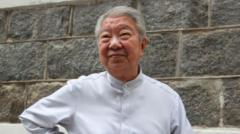The aftermath of the 2019 protests in Hong Kong has left a lasting mark on its participants, thousands of whom were arrested and subsequently navigated the challenges of reconciling their aspirations for democracy with the reality of political repression.
Resilience Amid Repression: The Lingering Impact of Hong Kong’s Protests

Resilience Amid Repression: The Lingering Impact of Hong Kong’s Protests
Six years after Hong Kong's pro-democracy protests, many participants face ongoing repercussions as their lives remain altered by a stringent political climate.
In June 2019, Hong Kong witnessed an unprecedented wave of protests, prompting masses to rally for greater democracy and civil liberties. Among the protesters were a spectrum of young individuals—from aspiring software engineers to social workers—who hoped their voices would spur changes in governance. However, the quest for democratic reform was doomed to be thwarted as demonstrators faced a harsh crackdown from authorities.
Under China's national security law, enacted in response to the unrest, more than 10,000 individuals were arrested during the protests. While some managed to relocate abroad or return to their regular lives, those convicted of charges like rioting or national security offenses face significant obstacles. Many have been unable to resume their pre-protest careers, leading to a profound sense of disillusionment and isolation.
With the resolution of mass protests, the atmosphere in Hong Kong remains tense. Public expressions of dissent have effectively been suppressed, resulting in a cultural climate where many young activists have struggled to find their place. The stark contrast between their aspirations for a democratic society and the reality of their current situation weighs heavily on their aspirations and future prospects, illustrating the long-term repercussions of political engagement in an increasingly repressive environment.
Under China's national security law, enacted in response to the unrest, more than 10,000 individuals were arrested during the protests. While some managed to relocate abroad or return to their regular lives, those convicted of charges like rioting or national security offenses face significant obstacles. Many have been unable to resume their pre-protest careers, leading to a profound sense of disillusionment and isolation.
With the resolution of mass protests, the atmosphere in Hong Kong remains tense. Public expressions of dissent have effectively been suppressed, resulting in a cultural climate where many young activists have struggled to find their place. The stark contrast between their aspirations for a democratic society and the reality of their current situation weighs heavily on their aspirations and future prospects, illustrating the long-term repercussions of political engagement in an increasingly repressive environment.


















